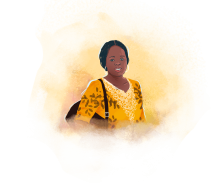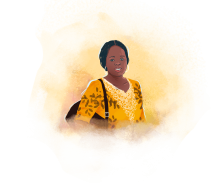Ariet Ojulu is the Head of the Women, Children, and Youth Affairs Office in Itang Woreda, Ethiopia, a district neighboring three refugee camps hosting refugees predominantly from South Sudan.
From where I stand: “I see positive change through the power of women’s organizations and adolescent peer groups in our community.”
I see positive change through the power of women’s organizations and adolescent peer groups in our community. More girls are standing up against their families to stay in school. For example, the other day a girl came to my office and told me that she lost her parents and now her grandfather wanted to force her to marry a man old enough to be her father, but she wanted to stay in school. I contacted her grandfather and her husband-to-be informing them that the girl was underage and it would be a crime to marry her. When they refused to listen and intimidated the girl, I informed law enforcement who transferred her to a boarding school to continue her education.
As a female government official working for gender equality, I often face negative attitudes from the community. However, this will not stop me from speaking out on women’s rights because it is part of my core values. In my district we face recurrent conflicts, abduction of children and sexual and reproductive health challenges. I worry about increased new HIV infections, unwanted pregnancies and unsafe abortion causing severe health complications or even death. The solutions to these issues warrant more than medical resources. Even with limited financial and human resources, I experienced how communities can alleviate some of these problems. In parallel to strengthening community structures, my office supports law enforcement agents to ensure protection of the rights of women and girls.
By participating in community dialogues, I have a better understanding of the issues women, adolescents and children face, which makes me a better advocate for their rights. For example, by listening to the community members, we understood that pregnant women were requested to pay for using the ambulance service. I informed the Head of the Health Bureau and we decided to provide the service free of charge. I am now happy to say that almost all pregnant women are using the ambulance service to reach the health center to give birth.
I am proud to be a women’s rights activist working together with the women’s organizations in our community for gender equality.”
Ariet Ojulu is the Head of the Women, Children, and Youth Affairs Office in Itang Woreda, Ethiopia. Her work and advocacy relate closely to the Sustainable Development Goals, particularly SDG 5 on gender equality and SDG 3 on good health and well-being. She is actively engaged in UN Women’s Programme on Women’s Empowerment in Sexual, Reproductive, Maternal, Newborn, Child, and Adolescent Health rights in humanitarian settings in the Horn of Africa Region (POWER), which is supported by the Austrian Development Agency. The programme focuses on removing the barriers that prevent women, adolescents, and girls from accessing their rights to and seeking services for sexual, reproductive, maternal, newborn, child and adolescent health.

